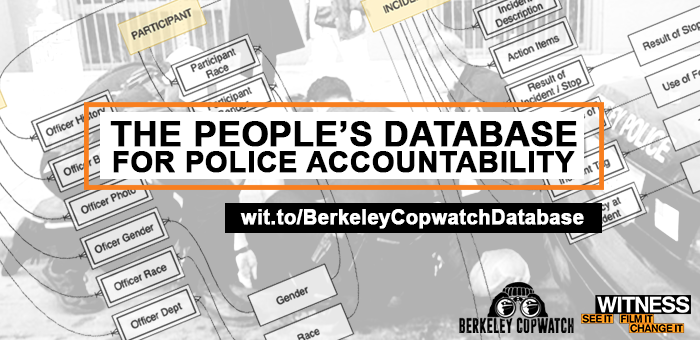Announcing The People’s Database for Community-based Police Accountability: A Berkeley Copwatch + WITNESS initiative
WITNESS and Berkeley Copwatch are excited to announce the release of a new set of tools and guidance to support community-based police accountability groups in collecting, organizing and storing documentation of police encounters so that they can more quickly and effectively conduct investigations, coordinate justice campaigns, and challenge unjust laws, policies and police practices. Learn more about the project, read a Q&A with Berkeley Copwatch and download the resources here.
For over 30 years, Berkeley Copwatch has been filming police misconduct and serving as a hub for people to gain valuable Know Your Rights information and report abuses by law enforcement. As a volunteer-led group that represents a broad range of ages, abilities, LGBTQ folxs, unhoused individuals, students and local organizers, they have been instrumental in collecting footage and documentation to support legal, advocacy and policy initiatives. Their work has also helped create a rich record of community-led initiatives around issues like gentrification, racism and abusive policing against vulnerable populations like the unhoused community and people living with mental health issues.
Given the challenges of maintaining decades of sensitive footage in an all volunteer-run organization, WITNESS engaged in this collaboration with the objective of identifying ways to streamline their workflows, develop important protocols and policies for users, and strengthen their platforms for collecting, organizing and analyzing data in ways that make the information more useful to individuals, lawyers, journalists and advocates. While the Database is not intended to be put online or made public because of privacy and security issues, it serves as an internal resource for the group, and the information will be used for organizing purposes and shared with trusted sources and community members upon request.
Already this work has supported Berkeley Copwatch to influence policy discussions of the Berkeley Mental Health Commission by working with various commissioners to show them footage of police use of spit hoods and the police role in mental health emergencies. They also shed light on the misconduct of UC Berkeley Officer Sean Aranas, who abused homeless people for years, by curating footage of many separate incidents of his gross misconduct. He “retired” within two months of the release of their footage and campaign.
Through our many hours of planning, building, testing, tinkering and practicing, we’ve gained many learnings that we are eager to share with other human rights documentation groups. We’ve made available a Planning Workbook, a FileMaker Pro Template, Data Diagrams, a customizable Data Dictionary and Controlled Vocabulary. Learn more about the project and download the resources here.
This project builds on our previous human rights database initiative Profiling the Police, a collaboration with El Grito de Sunset Park, and furthers our quest to identify simple, low-cost solutions for human rights defenders working to analyze, share and preserve video for advocacy and evidentiary purposes.

